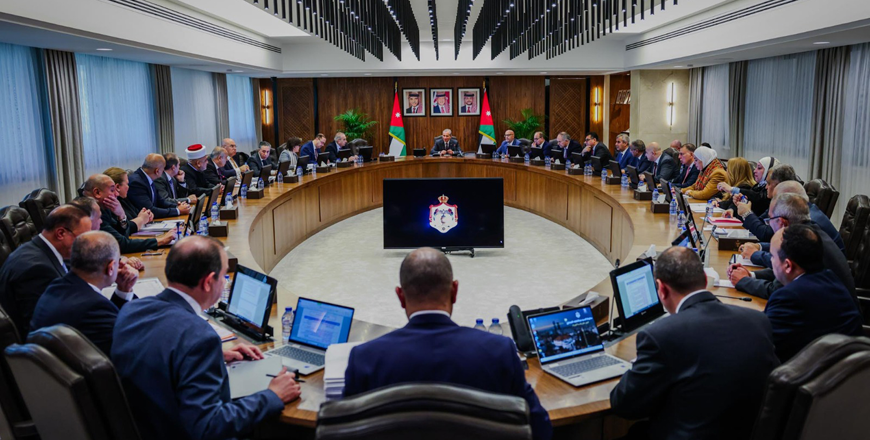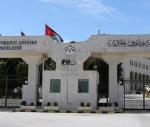You are here
Cabinet approves virtual asset regulation framework to boost digital economy
By JT - Jan 26,2025 - Last updated at Jan 26,2025

Prime Minister Jafar Hassan chairs a Cabinet on Sunday, during which a plan is approved to develop a comprehensive legal framework to regulate virtual and digital assets (Prime Ministry photo)
AMMAN — The Cabinet on Sunday approved a plan to develop a comprehensive legal framework to regulate virtual and digital assets, aiming to establish clear governance mechanisms for this rapidly growing sector within a year.
The decision, taken during a Cabinet meeting chaired by Prime Minister JaafarHassan, aligns with the Future Technology Council's programmes, which were initiated under Royal directives and are overseen by HRH Crown Prince Hussein, according to a Prime Ministry statement.
The initiative underscores the increasing significance of virtual assets in the global financial landscape, reflecting the government's commitment to providing opportunities for Jordanian youth to engage in the digital economy
Jordanian innovators have already made their mark, establishing several prominent digital asset platforms in the region, the statement said.
The Cabinet has mandated the Jordan Securities Commission (JSC) to develop the necessary legal, procedural and technical frameworks for the licensing and accreditation of international virtual asset trading platforms.
These frameworks will set conditions for companies operating in the sector, with the entire process expected to be completed within 12 months.
The groundwork for this initiative was laid earlier this year when a high-level ministerial committee was formed to study legislative and governance models for virtual asset platforms.
Led by the minister of digital economy and entrepreneurship, the committee includes representatives from the Central Bank of Jordan (CBJ), the Jordan Securities Commission (JSC), the Income and Sales Tax Department, the National Cybersecurity Centre and the General Intelligence Department.
A preliminary study conducted by the JSC identified the need for specialisedlegislation to regulate trading in virtual assets and emphasised the importance of aligning with global best practices to combat financial crime.
By creating a secure and transparent regulatory environment, the government aims to attract foreign investment, empower local entrepreneurs and position Jordan as a regional leader in financial technology.
The initiative is also part of Jordan's economic modernisation vision, which prioritises the promotion of innovation and the adoption of advanced technologies in key sectors.
Countries such as the UAE, Bahrain, Turkey, the US and Japan have demonstrated the potential of regulated virtual asset markets to drive economic growth, providing a blueprint for Jordan's ambitions.
The framework will address all aspects of virtual asset governance, with a focus on flexibility to encourage start-ups and innovation. Advanced cybersecuritymeasures will be incorporated to protect user data and assets, while robust anti-money laundering protocols will ensure compliance with Financial Action Task Force (FATF) guidelines, the statement said.
The Council of Ministers has also approved several key projects in the water and agriculture sectors, along with measures to address outstanding tax issues and enhance the Kingdom's framework for the rights of persons with disabilities.
To enhance water and sanitation infrastructure, the Cabinet approved the extension of the Ain Ghazal sanitation project, which includes an amendment to the existing agreement with the European Bank for Reconstruction and Development (EBRD), with an additional grant to support procurement and supervision activities.
The project, expected to be completed by the end of this year, involves constructing a pipeline to transport wastewater from Ain Ghazal to the Al Kherbeh Al Samratreatment plant, ensuring more efficient wastewater management for the area, according to the statement.
The Cabinet also approved financing for the Jordan Valley Water Resources Project through a 24.3 million euro agreement with the European Investment Bank (EIB).
The project aims to enhance water management in the Jordan Valley by rehabilitating irrigation networks, constructing a closed water carrier to reduce losses from the King Abdullah Canal, and building a new water reservoir, ensuring a more reliable water supply for farmers, particularly during droughts.
The Council of Ministers also approved the allocation of nearly 1,300 dunums of land in Aqaba for agricultural projects.
The land, located in the villages of RaydanAl-Aqaylaih and Bir Mathkour, will be leased to boost agricultural production and generate employment opportunities for the local community.
The projects will focus on crops suitable for the region’s climate, including the production of animal feed.
The approval is contingent upon the establishment of these projects within three years, after which the decision may be revoked if progress is not made.
As part of efforts to stimulate economic activity, the Cabinet also approved the settlement of tax issues for 674 companies and individuals.
This initiative aligns with the government's broader economic modernisation agenda, which seeks to encourage investment and support private sector growth.
The Cabinet also approved amendments to the administrative regulations of the Higher Council for the Rights of Persons with Disabilities, meant to expand the council's role in promoting awareness of disability rights, coordinating with donors and implementing relevant projects.
Related Articles
AMMAN — Chairman of the Board of Commissioners of the Jordan Securities Commission (JSC) Adel Bino on Sunday said that the Cabinet's decisio
AMMAN — Minister of Government Communications Mohammad Momani on Tuesday announced key decisions made by the Cabinet during its sessio
AMMAN — The Cabinet on Wednesday approved a series of key legislative reforms to bolster Jordan’s economic stability and foster development across several sectors, including cooperatives, customs, and virtual assets.














